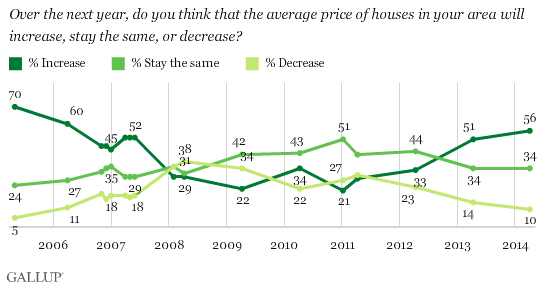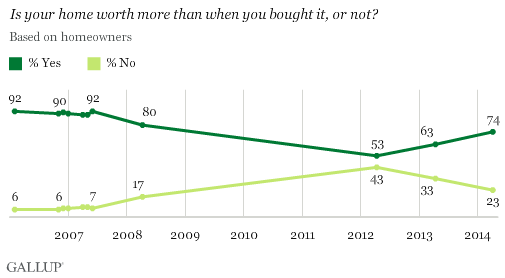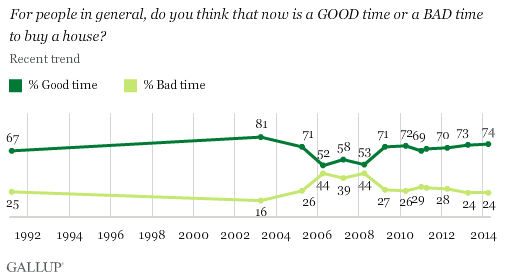A new Gallup survey seems to indicate that Americans are falling in love with real estate again. The poll, conducted among over a thousand respondents this month, shows that 56 percent of Americans think the average price of a home in their local area will increase compared to only one-third who thought so two years ago and 21 percent, a survey low, in January 2011. Another 34 percent expect prices to remain at about the same level, leaving only 10 percent who believe prices will fall again. The current euphoria is not up to pre-crash standards, but is closing in on the peak 60 percent who expected appreciation in late 2006.

The results were gathered by Gallup's annual Economy and Personal Finance poll, which has tracked Americans' perceptions of the housing market annually since 2005. In the years following the housing crisis, 2008-2011, Gallup said Americans were more likely to look for declining home values in their local area than any appreciation. That began to change by April 2012 when public optimism about home values outweighed pessimism by 33% to 23%. Now, more than five times as many Americans believe local home values will increase as believe they will decrease.
There is a strong regional bias in the survey with those living in the West most likely to think home values will increase, at 72%. Prices have risen by double digits in several western states, especially California. Conversely only 44 percent of residents in the East expect price increases. Attitudes of those in the South and Midwest closely mirror national numbers at 54 percent and 53 percent respectively.
Gallup said respondents' opinions may be influenced by their own experiences. About 64 percent of Americans are homeowners and 74 percent of them say their home is worth more today than when they bought it. Last year 63 percent said their homes had increased in value and 53 percent made this claim in 2012. Even with the increase however, homeowners are nowhere near where they were in the 2006 and 2007 surveys when upwards of 90% of homeowners said their home value exceeded the purchase price. Responses to this question may also mean that fewer homeowners are "underwater," owing more on their mortgage than their houses are worth.

Seventy-four percent of Americans say it is a good time to buy a house, while 24% call it a bad time. That ranks among the most positive readings Gallup has received. Responses to this question actually bottomed out at the height of the housing boom when prices peaked and only 52 percent considered it a good time to buy. Even as home values plummeted over the next two years Americans continued to be pessimistic about buying a home. In 2009 when depressed home values meant houses were a better buy the number grew to around 70 percent and has remained near there with what Gallup called "marginal increases" in each of the last three years. Homeownership factors into this response; 81 percent of current owners consider it a good time to buy but only 60 percent of renters.

Gallup says that Americans' views of the housing market were clearly shaken during the downturn, but have mostly recovered today. The nearly three in four who say it is a good time to buy a house could reflect the realization that the worst of the housing crisis is over, but that values have not yet risen to a level where homes are over-priced. "These more positive views of the housing market may help foster a situation in which home buying activity increases and home values continue to rise over the next year," the Gallup report says.







